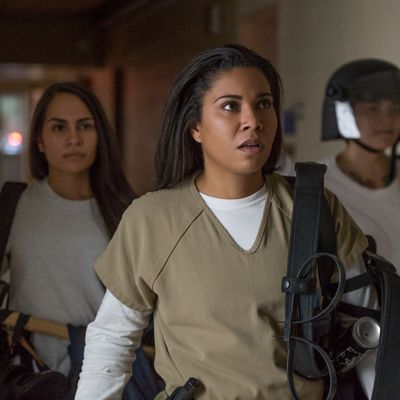
Orange Is the New Black seemed to dig itself into a narrative hole at the end of season four with the brutal death of one of its most beloved characters, Poussey Washington (Samira Wiley), in a jailhouse dustup that echoed subjects of Black Lives Matter protests (the choking death of Eric Garner in particular). It was an event so harrowing that it pulverized the show’s delicate balance of social criticism, inspirational empowerment subplots, and R-rated sitcom tomfoolery. Where could Orange possibly go after such an emotional catastrophe? Loss of innocence is probably the wrong phrase to describe what Poussey’s death signified — Litchfield Prison has always been a tough place full of hard characters (and others who weren’t hard enough to survive alongside them, but who might eventually get there). But during the hiatus between seasons four and five, there was a lingering sense that a boundary had been crossed and was receding in the rearview mirror. Would Orange figure out a way to hit the reset button, which is something all institutional series, whether based at prisons, hospitals, police stations or schools, have to do if they’re going to move forward after an emotionally shattering event?
The show deserves credit for responding to the Poussey crisis by continuing to dig for 13 more episodes, perhaps hoping that it would emerge on the other side of the world and be able to start a new life. All of season five unfolds over the course of a few days following an inmate takeover of the prison, a structural gambit unlike anything that Orange has attempted before.
Unfortunately, the same characteristics that make the show so distinctive and popular work against it as it tries to create something like a 13-hour-long “bottle episode.” The takeover story line has echoes of famous prison uprisings, Attica in particular. The fact that it’s a women’s correctional facility with both minimum and maximum security aspects doesn’t lessen the sense that it’s perched on the edge of still-greater levels of violence. I wouldn’t presume to say what series creator Jenji Kohan and her writing staff should have done, but what’s onscreen feels like a series of half-measures. The prison-uprising structure allows the show to stage scenes that would never happen if guards were around. Highlights include Lea DeLaria’s Carrie “Big Boo” Black duded up in a suit and tie and carrying on like a wily Southern lawyer in a John Grisham thriller, and a scene where a group of inmates sit around smoking pot and drinking beer while reminiscing about their sexual experiences.
But in other ways, this feels like another Orange season with all of the familiar, often delightful elements we’ve come to expect, including the seemingly mandatory, though often deftly handled, flashbacks to inmates’ lives before they ended up at Litchfield. (The most striking feels like a cross between The Young Poisoner’s Handbook and Moonrise Kingdom, if you can imagine such a thing.) At its best, season five of Orange finds a way to be true to its established self without neglecting the present-tense existential threat posed by the cops, guards, and media surrounding Litchfield. Friendships are frayed and repaired, characters discover new interests and have life-changing epiphanies, and there’s a major development (I won’t say which character experiences it) that represents the accidental fulfillment of a not-so-secret wish.
At its least effective, the show goes oddly slack and allows the tension that the season-four cliffhanger had established to evaporate. Wisecracks and kiss-off lines that might’ve satisfied in an earlier incarnation of Orange feel somehow off here. The show’s affinity for M*A*S*H-like gallows humor yields excellent bits, starting in the premiere with a personal-supplies request getting dutifully filled while hell is breaking loose, and continuing through the finale, which includes a strategy meeting in a makeshift “secret bunker.” Episode 13 is so strong that it inspired me to go back and rewatch scenes I didn’t like in the middle section to see if I’d misjudged them.
I don’t think I did. There are hilarious and piercing moments and a few sublime images, and Danielle Brooks, Yael Stone, Elizabeth Rodriguez, and Selenis Leyva do some of their best work to date; Brooks is especially moving in a story line about Taystee crusading to get justice for her dead friend, taking on the private company that manages the prison and demanding reforms in exchange for peaceful surrender. But even the best performances and moments suffer from the season’s lack of focus, inability to shift tonal gears smoothly, and Netflix bloat (the siege might’ve worked better as a more compact arc rather than a 13-episode extravaganza). Points for audacity notwithstanding — this is another instance of an ambitious and unusual series writing conceptual checks that its storytelling prowess can’t cash.





